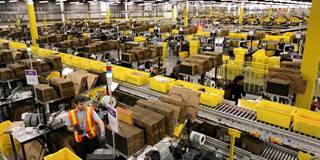In an era of rapid technological change, it is widely assumed that disruptions to labor markets are inevitable – and positive – indicators of a country's international competitiveness. But should policymakers really use the economy to advance national power at the expense of the many people and regions left behind?
LONDON – Not so long ago, there were two competing explanations of unemployment. The first was the Keynesian theory of deficient demand, which holds that workers become unemployed “involuntarily” when their community lacks the money to buy the goods and services they produce. The second was the view often associated with the Chicago School, according to which unemployment is a voluntary choice of leisure over work at whatever the offered wage.
Now, a third explanation is gaining traction: declines in full-time work opportunities and real wages are both due to automation. To be sure, the idea that robots are gobbling up human jobs is a new slant on the very old problem of technological unemployment. But it is a slant that merits attention, because the problem cannot be solved with the conventional policy responses.
The “official” narrative about technology treats accelerating change as inevitable. According to acronymically named institutions, think tanks, task forces, et hoc genus omne, automation and artificial intelligence (AI) will soon eliminate or alter a large but unpredictable number of human jobs.

LONDON – Not so long ago, there were two competing explanations of unemployment. The first was the Keynesian theory of deficient demand, which holds that workers become unemployed “involuntarily” when their community lacks the money to buy the goods and services they produce. The second was the view often associated with the Chicago School, according to which unemployment is a voluntary choice of leisure over work at whatever the offered wage.
Now, a third explanation is gaining traction: declines in full-time work opportunities and real wages are both due to automation. To be sure, the idea that robots are gobbling up human jobs is a new slant on the very old problem of technological unemployment. But it is a slant that merits attention, because the problem cannot be solved with the conventional policy responses.
The “official” narrative about technology treats accelerating change as inevitable. According to acronymically named institutions, think tanks, task forces, et hoc genus omne, automation and artificial intelligence (AI) will soon eliminate or alter a large but unpredictable number of human jobs.